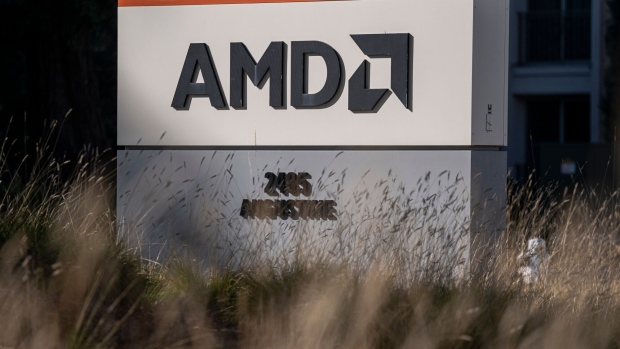Aug 1, 2023
AMD Gains After Chipmaker Tops Estimates, Makes AI Inroads
, Bloomberg News

(Bloomberg) -- Advanced Micro Devices Inc. gained in late trading after the chipmaker topped second-quarter estimates and touted inroads in artificial intelligence computing, putting it in closer competition with Nvidia Corp.
Sales and profit both exceeded analysts’ projections last quarter, and AMD’s accelerators — a type of processor that speeds up the training of AI software — are drawing more interest from customers. That’s spurred optimism that the company can gain ground on Nvidia and capitalize on the rapid spread of artificial intelligence across industries.
The market for AI accelerators in data centers could top $150 billion by 2027, Chief Executive Officer Lisa Su said on a conference call with analysts. Customer “engagements” with AMD’s AI products increased more than seven times last quarter as clients prepared to bolster their infrastructure, she said.
“While we are still in the very early days of the new era of AI, it is clear that AI represents a multibillion-dollar growth opportunity for AMD,” she said.
The upbeat outlook sent the shares up about 4% in late trading. Already, the stock had climbed 82% this year through the close, making AMD the second-best-performing member of the Philadelphia Stock Exchange Semiconductor Index. Its AI prospects have fueled much of that rally.
AMD’s PC chip division also performed better than expected last quarter, a sign that market is bouncing back from a deep post-pandemic slump. Second-quarter earnings were 58 cents a share, excluding some items. That compared with an average analyst projection of 57 cents. Revenue came in at $5.36 billion, versus a prediction of $5.32 billion.
Third-quarter revenue will be $5.4 billion to $6 billion, AMD said. That compares with an average analyst estimate of $5.84 billion. The midpoint of that range would represent a gain of about 2.5% from the same period a year earlier, marking the end of a two-quarter retreat.
AMD is the second-largest maker of PC processors, after Intel Corp. That market is now recovering, and customers have mostly finished working through their excess stockpiles of components. Revenue at AMD’s PC chip unit was $998 million last quarter, topping the estimate of $840.9 million. Its gaming division generated $1.58 billion, just shy of the $1.62 billion projection.
AMD’s data center business, meanwhile, has taken longer than expected to recover from a downturn. Its sales were $1.32 billion last quarter, short of the $1.4 billion average estimate.
Data center demand should pick up again in the second half of the year — particularly the fourth quarter — even as some areas remain sluggish, AMD said. And the chipmaker will have its MI300 accelerator chip on the market by the final three months of the year, ready to meet the surge in AI demand.
“Customer interest is very high,” Su said on the call with analysts. Multiple customers are looking to deploy the MI300 accelerators as quickly as possible, she said.
One obstacle to boosting sales of AI accelerators: The US has placed restrictions on the export of such technology to China. Nvidia has created a less-powerful product for China that doesn’t violate US rules, and Su said Tuesday that AMD may consider doing something similar.
“Our plan is to, of course, be fully compliant with US export controls, but we do believe there’s an opportunity to develop product for our customer set in China that is looking for AI solutions,” she said.
Last week, Intel reported a surprise profit as both its data center and PC chip unit beat expectations. CEO Pat Gelsinger called the quarter a turning point for the company and said he’s taking back lost market share in laptop and desktop computers.
Read More: Intel’s Gelsinger Sees ‘Turning Point’ After Surprise Profit
At AMD, Su is credited with turning around the fortunes of a company that spent most of its history in Intel’s shadow. She’s taken advantage of stumbles at the larger rival and grabbed market share with new products.
But now investors want her to show similar progress against Nvidia, which has cornered the market for AI processors. AMD is the only other major provider of the type of graphics chips that those new accelerators are based on, but Nvidia has more than 80% of the market.
AMD is moving fast to build a foothold, Su said. The company has boosted its AI-related R&D spending and other investments, she said, “to capture a significant share of this emerging market.”
(Updates with CEO comments on China chip option in 13th paragraph.)
©2023 Bloomberg L.P.





